Like any other sector, the food and beverage industry experienced massive shifts brought about by the COVID-19 pandemic. However, as a provider of essential goods, the industry has survived and thrived despite trade restrictions and restaurant closures. This growth and overall bullish outlook are fueled—in no small part—by the resiliency and ingenuity of the industry when it comes to product lifecycle management (PLM).
PLM, however, is a complex process with many moving parts. It spans product design and production to marketing and planned obsolescence. This also involves many KPIs to measure performance across different functions. As such, a system is needed to tie these all together. This is why the popularity of PLM software for food and beverage is becoming more popular. Even smaller companies are adopting such tools.
If you are interested, then you’ve come to the right place. In this article, you will get to know the best PLM software and systems for food and beverage. Once you discover their special features, you can shorten your product research time and move on to building and trying out a shortlist.

Best PLM Software Software and Systems for Food and Beverage
Thanks to the ingenuity and resiliency of the food and beverage industry, continued growth is on the horizon. In 2021, the global combined market reached $435.3 billion. With optimism, experts predict that by the end of 2022, it will increase to $506.3 billion. By, 2025, the market is projected to amount to $856.9 billion.
The edible grocery category in the global food and beverage market alone is poised to grow by $569.5 billion in 2026 to reach $3.34 trillion from 2021’s $2.77 trillion. Ecommerce sales in the same category are also pegged to grow by $101.4 billion over the same period.
Source: Statista, 2022; Edge, 2022
But with growth comes fiercer competition. Savvy companies look for ways to have a competitive edge over direct and indirect competitors. Competitive advantages in the food and beverages industry can range from creating new product lines to optimizing value chain operations, and these need to be synergized. So, it is important for companies to have a 360-degree view of their entire operations. This is where the best PLM software and systems for food and beverage come into play.
For modern PLM, especially those involving ecommerce, a digital command center is a prerequisite to success. This is why PLM platforms are in demand. But, not all solutions are made the same. Some offer a general PLM deployment while others are highly-specialized in product design or roadmapping. In the list below, you will get to know the best ones around—the top general solutions together with specialized PLM software food tools. In this way, you can navigate your organization better through the impending market growth and stiffer competition.
What are the key features to look for in food and beverage PLM software?
When selecting PLM software for the food and beverage industry, it’s essential to consider key features that address the unique needs of this sector. The right PLM solution can streamline processes, ensure regulatory compliance, and foster collaboration across various teams. Here are some important features to look for:
- Regulatory Compliance Management: Food and beverage companies must comply with various regulations, including FDA, EU, and other regional guidelines. PLM software should offer tools to track compliance throughout the product lifecycle, automatically generating reports to ensure adherence to food safety standards.
- Supply Chain Integration: A PLM system that integrates with supply chain management tools helps ensure efficient sourcing of ingredients and materials and meets quality standards. This integration can reduce lead times, minimize waste, and optimize production schedules.
- Recipe and Formulation Management: Effective PLM software should allow for easy creation, modification, and tracking of recipes and product formulations. This feature is critical for maintaining consistency in product quality while offering flexibility to adjust recipes based on consumer preferences or regulatory changes.
- Quality Control and Traceability: PLM systems should support quality control processes and allow real-time tracking of each ingredient’s source and batch number. Traceability ensures that any product quality or contamination issues can be quickly addressed, ensuring consumer safety.
- Collaboration Tools: PLM software should facilitate communication between cross-functional teams, including R&D, manufacturing, marketing, and quality assurance. Effective collaboration ensures that all departments are aligned and working towards the same goals, improving product development efficiency.
- Product Lifecycle Analytics: Advanced analytics capabilities help monitor product performance in the market, offering insights into customer preferences and operational efficiencies. This data can inform future product development strategies and help companies stay competitive in the rapidly evolving food industry.
Best PLM Software Software and Systems for Food and Beverage in 2026
1. monday.com
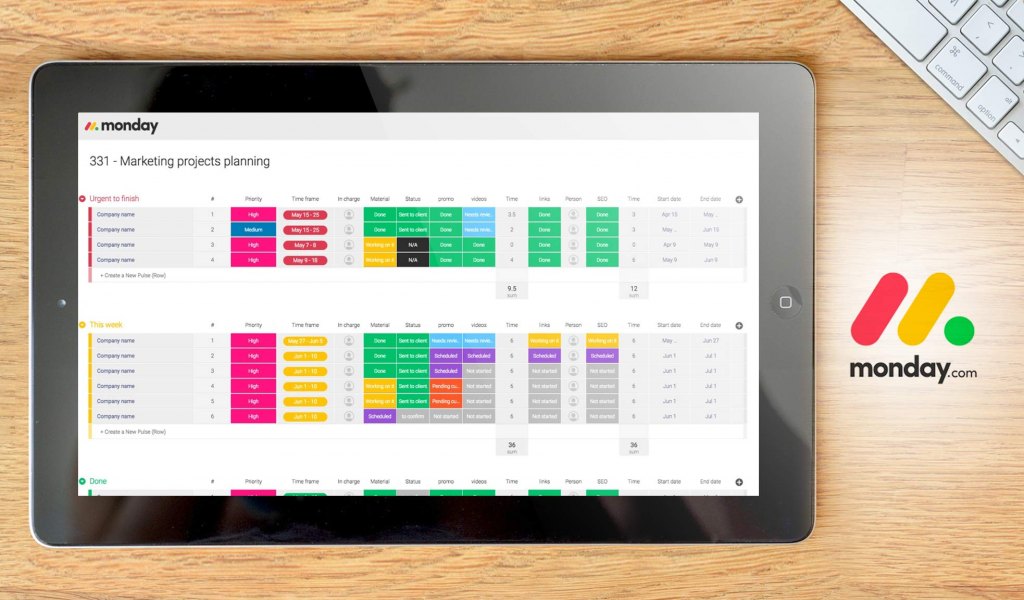
monday.com might just be the best digital solution available today. It is a highly-customizable cloud-based platform that best acts as the digital command center for business operations. It is flexible enough to handle all product lifecycle management processes, from sourcing and product planning to packaging design and marketing. It is not only its customizability that makes monday.com so powerful. The platform is fitted with native integrations with tons of software solutions. You can use this to set up triggers, notifications, and cross-application workflow automation.
Moreover, it provides users with collaboration and communication software tools. These include task management, file sharing options, @mentions, and many more. Also, all of these are housed in an easy-to-use highly-visual interface with a level of intuitiveness reminiscent of popular social media platforms. Additionally, like any good app for PLM, monday.com provides users with advanced intelligence solutions that are very customizable. Hence, users can put use their analytical creativity to its full potential.
Also, you can access all of these features via its mobile apps for both iOS and Android devices. All of these make monday.com a go-to application for food and beverage giants such as US Foods, Unilever, and Coca-Cola. Lastly, pricing starts at $8 per seat per month.
Detailed monday.com Review
Key Features of monday.com
- Customizable Workflows
- Highly-Visual Dashboards
- Cross-App Automations
- Collaboration Tools
- Role-Based Permissions
- Recipe Cost Tracking
- Connected Dashboards
- Advanced Analytics
2. SAP PLM

SAP PLM is one of the most popular PLM platforms in the world. It is a flexible general solution that can be customized according to a company’s needs. It has end-to-end features, ranging from product planning and design to manufacturing and delivery. Core features include product planning, BOD development, product compliance, and innovation management. These help food and beverage companies roll out competitive products that are up to standards.
The platform also offers collaboration tools such as task sourcing and product sharing for components. Also, it has roadmapping capabilities, thanks to its strategy and planning tools. Operations can also benefit from SAP PLM’s design and manufacturing synchronization feature. With this, critical functions can be managed in an integrated manner. In fact, many SAP PLM alternatives have used its pioneering design as a basis for their own offerings. Lastly, SAP PLM is only available via quote-based pricing.
Detailed SAP PLM Review
Key Features of SAP PLM
- Strategy and Planning
- Product Design
- Collaborative Development
- Compliance
- BOM Development
- Innovation Management
- Program and Project Management
- Design and Manufacturing Sync
3. Siemens Teamcenter PLM

Siemens Teamcenter PLM is another big-name PLM solution that’s popular among food and beverage companies. It offers a huge range of PLM features, from supply chain collaboration to artwork development for food products. It also has a laboratory management module to boot for innovation. It has an environmental compliance management module as well. Like other Siemens products, it is also fitted with business intelligence software tools for modernization. These include an advanced IoT and lifecycle analytics module that can help make companies more agile to customer demands and other indicators such as sustainability.
Of course, it also has essential financial management tools from product ideation to roll-out. Also, the platform integrates seamlessly with other solutions such as the SAP Business Suite and Oracle E-Business. Lastly, as it is deployed according to customer specifications, clients can avail of the platform via personalized quotes.
Detailed Siemens Teamcenter PLM Review
Key Features of Siemens Teamcenter PLM
- PLM Process Execution
- Financial and Budgeting
- Laboratory Management
- IoT and Lifecycle Analytics
- Artwork Development
- Consumer Packaged Goods Data Management
- Manufacturing Planning
- Package Design for Food and Beverage
4. Autodesk Vault

Autodesk Vault is another frontrunner among PLM solutions. It is primarily known for its collaborative product design module that is perfect for creating food manufacturing systems. The platform is also flexible and can be customized according to your preferences. Key features include product data management, quality management, and supplier collaboration. It also has BOM management and revision control features. Of course, like other top solutions, it provides users with advanced analytics and custom reporting capabilities.
You can also access these features via its mobile application for both iOS and Android devices. It works seamlessly with other products such as Factory Design Suite and Microsoft office. Lastly, pricing starts at $335 per year.
Detailed Autodesk Vault Review
Key Features of Autodesk Vault
- Concurrent Design
- PDM Workflows
- Projects and Reporting
- BOM Management
- Revision Control
- Enhanced Data Security
- Central Location for Project Data
- Unified Item and File Lifecycle Engine
5. Infor PLM Discrete
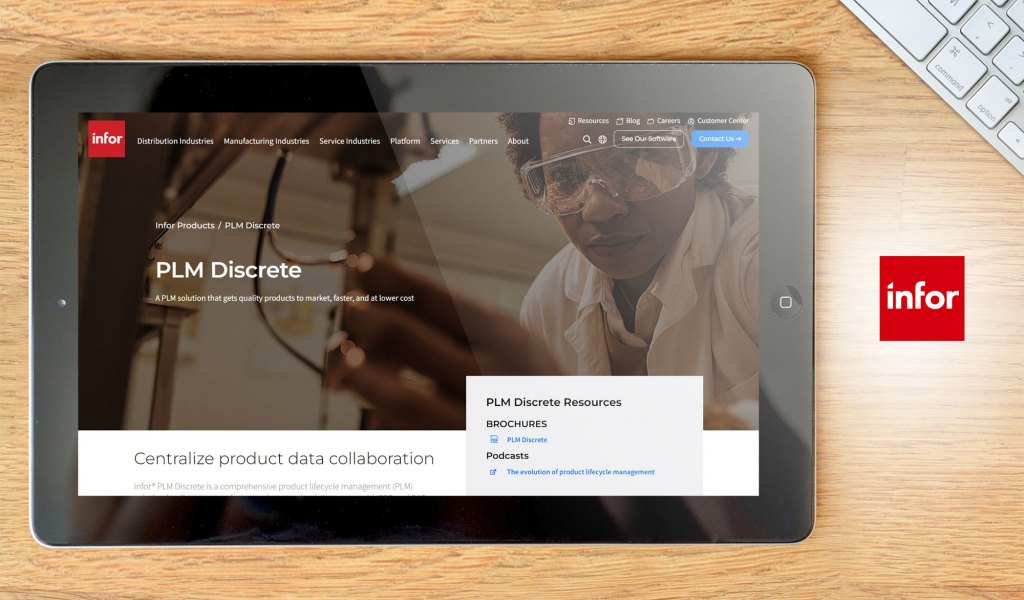
Infor PLM Discrete is a powerful PLM software suite for discrete manufacturers of all sizes. It is also known for its interoperability with other solutions such as ERP and manufacturing software. Core features include product management and change management. It also has revision management and cost management capabilities. The app has specialized PLM software food features like food traceability that can facilitate rapid recalls. Moreover, it helps users in calculating, simulating, and optimizing nutritional values and costs. It can also do this for possible allergens.
Of course, it is fitted with the basic cloud-based application features, including workflow automation tools, real-time analytics, and collaboration features. The product integrates with solutions such as VISUAL and SyteLine. Lastly, it is only available by custom quotes.
Detailed Infor PLM Discrete Review
Key Features of Infor PLM Discrete
- Discrete Manufacturing
- Product Management
- Cost Calculation
- Optimizing Nutritional Values
- Calculating Allergens
- Food Traceability
- Package Design
- Manufacturing Management
6. Infor PLM Optiva
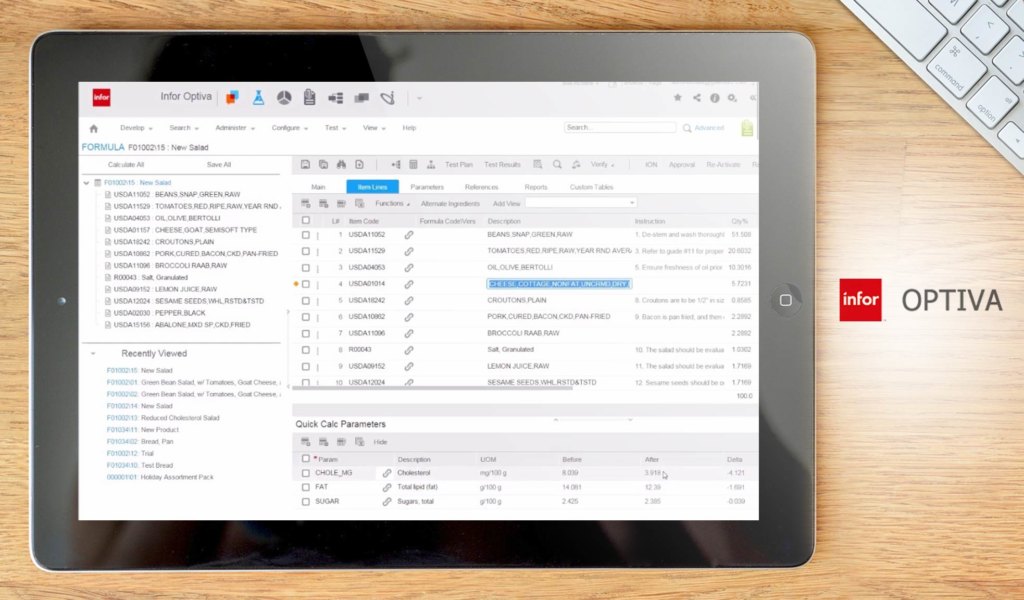
Infor PLM Optiva is another SaaS PLM solution made by Infor that is specially designed for process manufacturing. So, for large food and beverages companies, it can help them manage bulk manufacturing operations. Just like Discrete, the product offers industry-specific solutions, including those for compliance and food safety. The product is also fitted with ERP tools to help you optimize yields based on grading options. You can easily generate product labels with built-in regulatory content and ingredient specifications.
Other features include automated corrective actions, system-directed quality checks, and manufacturing data capture from upstream and downstream links. Lastly, as it is also deployed according to specific requirements, it is only available via custom pricing packages.
Detailed Infor PLM Optiva Review
Key Features of Infor PLM Optiva
- Process Manufacturing
- Workflow Management
- Compliance and Food Safety
- ERP Tools
- System-Directed Quality Checks
- Automated Corrective Actions
- Product Formula Management
- Communication Management
7. Oracle Agile PLM

Oracle Agile PLM is a cloud-hosted PLM software solution prized for its comprehensive set of features. Key features include innovation management, product development, quality management, product master data management (MDM), and configurator modeling. The solution is also popular among businesses in the consumer goods and restaurant industries. This is because of its customer intelligence features that allow companies to gain insights from customer behavior data.
The product can easily be connected to other business solutions, thanks to its API. Furthermore, it is deployed according to your specifications. Thus, it is only available via quote-based plans.
Detailed Oracle Agile PLM Review
Key Features of Oracle Agile PLM
- Product Lifecycle Analysis
- Cost and Quality Management
- Customer Insights
- Supply Chain Management
- Communication Tools
- Connected Logistics
- Intelligent Trace and Track
- Advertising
8. PTC Windchill
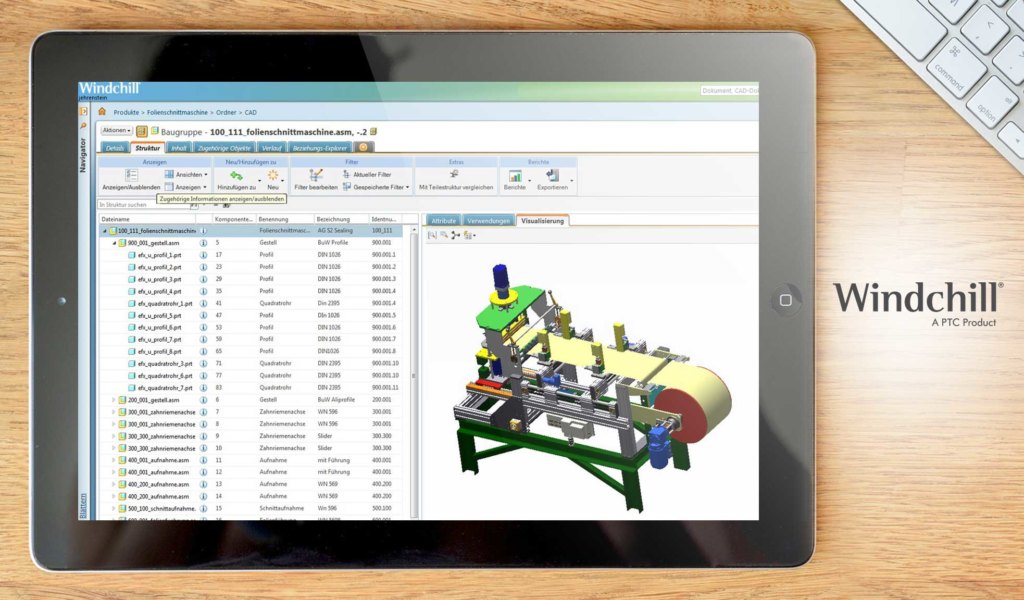
PTC Windchill is a PLM software solution that aids businesses in planning, designing, and moving their products in a streamlined fashion. Key features include product management, quality management, supplier management, and process management. The product also has reporting tools to help users make better data-driven decisions. These include financial intelligence features like cost analysis.
PTC Windchill integrates with a wide variety of tools, including Autodesk and Eclipse. It is offered in three quote-based tiered plans.
Detailed PTC Windchill Review
Key Features of PTC Windchill
- Product Management
- Reliability Management
- Design Details
- Design Generation
- Cost Estimation and Analysis
- Collaboration Management
- Suppliers Management
- Process Management
9. Upchain PLM
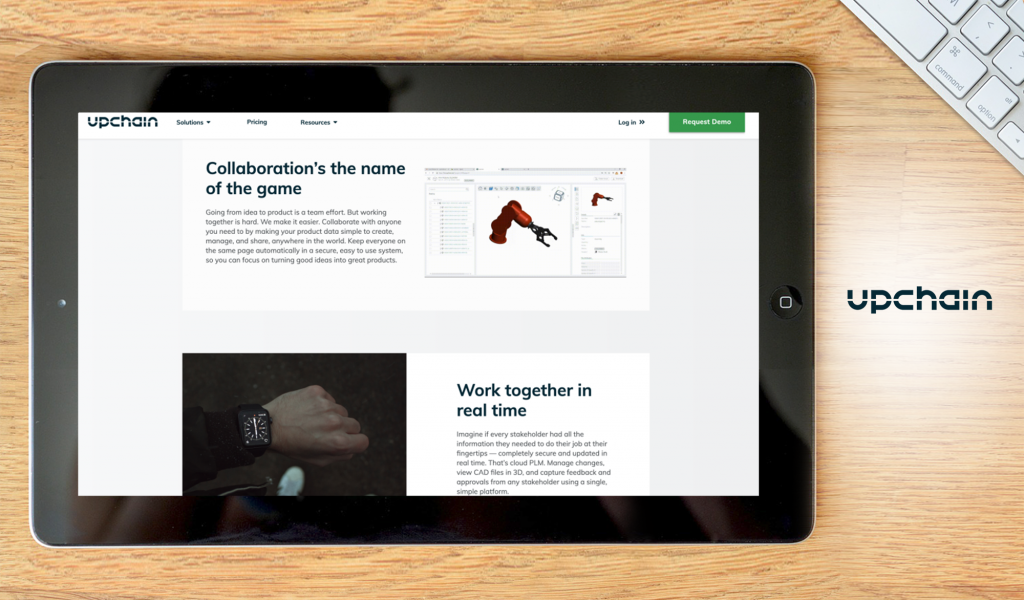
Upchain PLM has become a go-to application for many, not only for its comprehensive PLM features but also for being very easy to use. Also, it provides users some flexibility when it comes to feature deployment. So, you won’t have more or fewer features than you need. Plus, the pricing is very affordable. Key features include ECR creation, built-in project management templates, BOM management, and task dependencies. It also sports a full revision control capability and is fitted with ISO standards compliance features. Upchain PLM also works with other solutions like AutoCAD and Microsoft Office. Lastly, pricing starts at $20 per user per month.
Detailed Upchain PLM Review
Key Features of Upchain PLM
- BOM Management
- Task Dependencies
- Project Management
- Automated Parts Numbering
- Full Revision Control
- API Integrations
- ECR Creation and Management
- Built-In Templates
10. Dassault ENOVIA
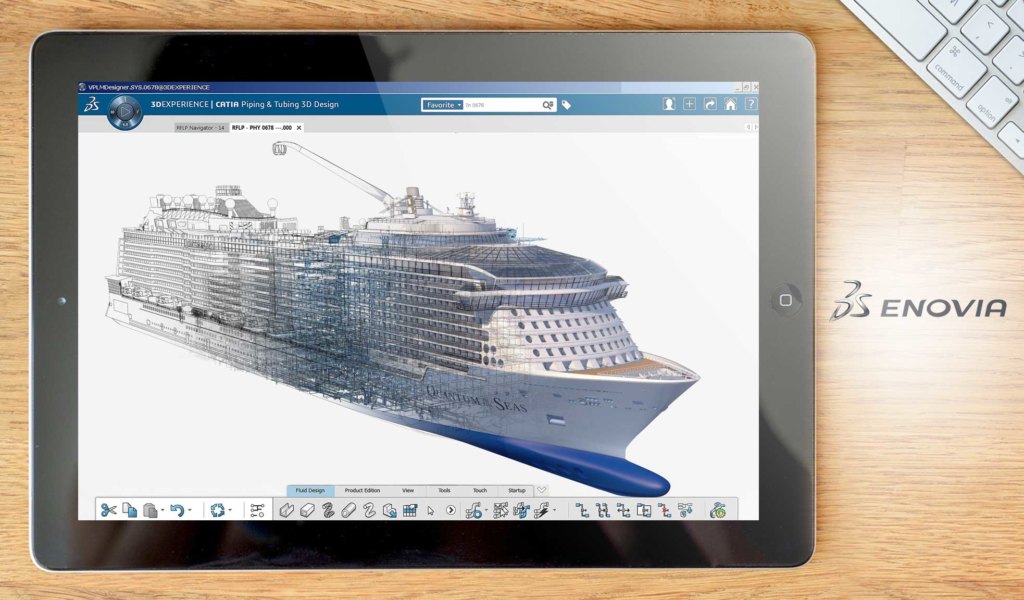
Dassault ENOVIA is a cloud-based collaboration solution designed for product lifecycle management. The product brings various PLM functions together, including network value analysis and product planning. Key features include program management, project management, BOM management, and quality management. It also provides users with software solutions for true global product development. With these, Dassault ENOVIA has become one of the top PLM solutions.
The software provider also has industry-specific solutions, including laboratory management for product innovation and compliance features. Additionally, the product also works well with other third-party tools such as leading CAD systems for food and beverage equipment design. Lastly, Dassault ENOVIA is only available via custom pricing.
Key Features of Dassault Enovia
- BOM Management
- Design Management
- Global Product Development
- IP Classification and Management
- Program Management
- Laboratory Management
- Strategic Supplier Relationships
- Configuration and Change Management
11. Roadmunk
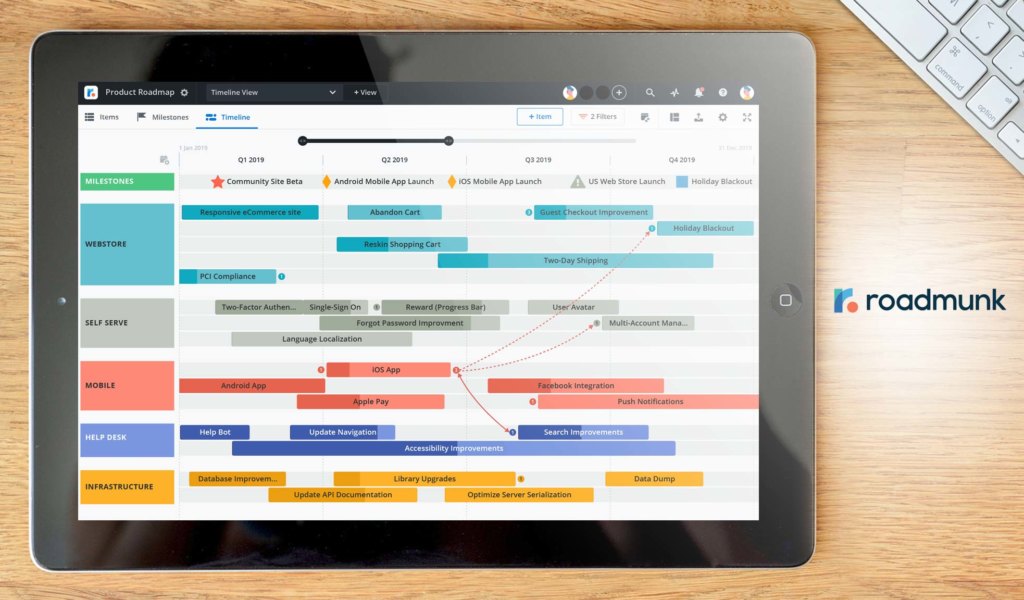
Roadmunk is a PLM platform prized for bringing product management and marketing teams closer. It helps these teams collaborate on different functions and at different levels of product lifecycle management. Key features include collaboration tools, sharing options, and task management. The product also provides a private cloud to its clients, complete with a data import functionality. With these, users will be able to easily work together on how to roll out their new food and beverage products.
One unique thing about Roadmunk is that it provides clients with stakeholder feedback mechanisms. Hence, it is deemed a boardroom-ready PLM, allowing upper management access to product lifecycle management data and processes. Moreover, the product is also very flexible in terms of feature deployment. Pricing starts at $19 per month billed yearly. Lastly, it also integrates with other solutions such as Trello.
Detailed Roadmunk Review
Key Features of Roadmunk
- Templates
- Data Imports
- Private Cloud
- Stakeholder Feedbacks
- Multiple Views
- Task Prioritization
- Sharing Options
- Collaboration Tools
12. Serena Business Manager
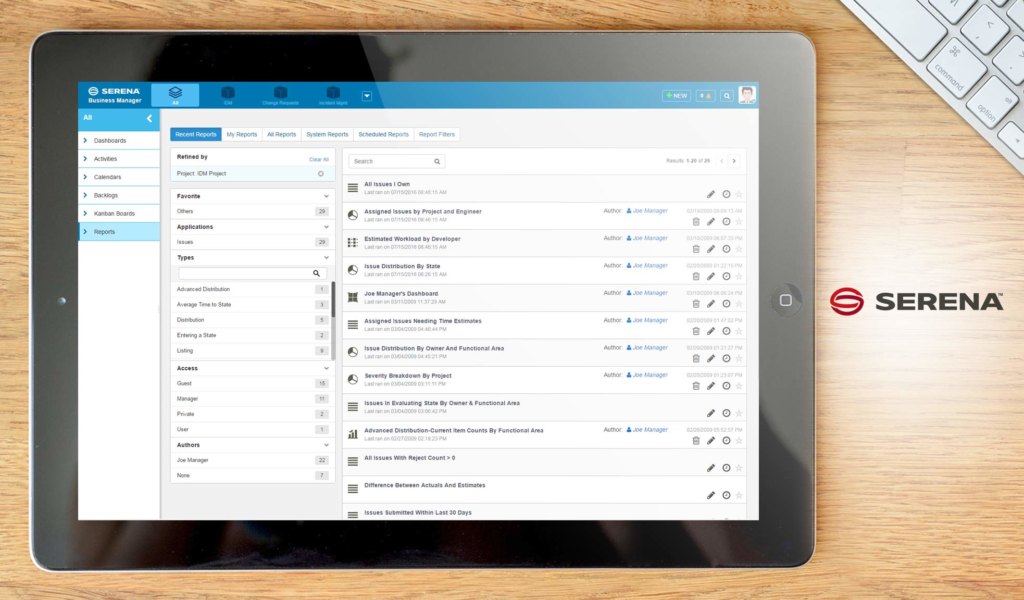
Serena Business Manager is a flexible PLM solution that can be employed for product lifecycle management by SMEs. It is quite a simple-to-use solution that is packed with features, including productivity tools and automation. The product provides users with a unified work center with Kanban and backlog views to keep everybody on the same page. Moreover, these features are accessible via its mobile apps for Android and iOS devices. Lastly, Serena Business Manager is only available via custom pricing.
Detailed Serena Business Manager Review
Key Features of Serena Business Manager
- Unified Work Center
- Backlog View
- Kanban View
- Calendaring
- Report Center
- Real-Time Notifications
- Communication Tools
- Mobile Client
13. Dozuki Electronic Work Instructions
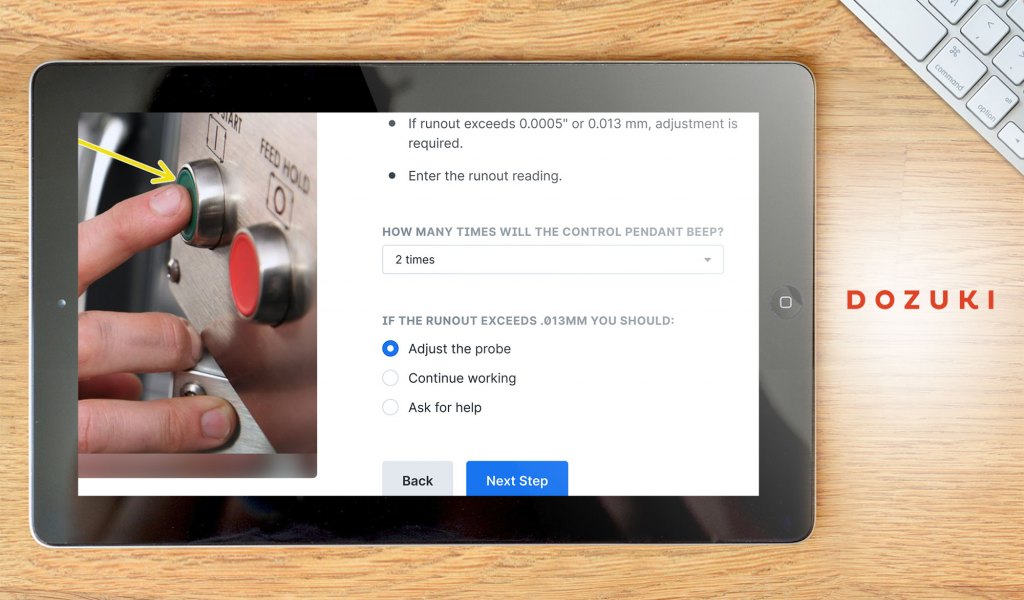
Dozuki Electronic Work Instructions is a cloud-based document generation software solution for product lifecycle management. It helps users create work instructions, training materials, technical documents, and many more to provide strategic, tactical, and operational PLM directions. Of course, as it should, the software supports visuals, including videos for better clarity and engagement in communication. Key features include version control, streamlining, content visualization, feedback management, data centralization, and permission-based access.
The platform is also fitted with reporting tools, complete with intelligent data production and analysis features. Furthermore, Dozuki integrates seamlessly with other software solutions, thanks to its open API offering. So, users will be able to make it work with virtually any digital tool such as ERP software.
Detailed Electronic Work Instructions Review
Key Features of Dozuki
- Content Modularity
- Creation and Modification
- Searching and Browsing
- Intelligent Data Production and Analysis
- Data Centralization
- Feedback Management
- Traceability
- Version Control
14. Autodesk Fusion 360

Autodesk Fusion 360 is a PLM software suite designed to help companies unify and streamline all their PLM processes. It is popular among manufacturing companies in the food and beverage industry. It helps users create precise designs for manufacturing systems to help them create custom-branded products. Key features include life cycle control, product data management, task management, quality management, and bill of materials view. It also has communication with data storage and workflow approvals.
And, it is fitted with a supplier collaboration module as well. The product is only available via quote-based pricing. Also, you can access its features via its mobile applications for both iOS and Android devices.
Detailed Autodesk Fusion Lifecycle Review
Key Features of Autodesk Fusion 360
- Product Data Management
- Lifecycle Control
- Change Management
- Supplier Collaboration
- Task Management
- Quality Management
- Bill of Materials View
- Digital Signatures
15. ProdPad

ProdPad is a straightforward PLM software product offering good product management and roadmapping capabilities. Core features include goal setting, user stories, creator tracking, and project tracking. It also has an idea ranking feature. These tools are great for smaller food and beverage operations. Even so, it offers advanced reporting capabilities. Furthermore, it also has common collaboration features such as real-time notifications, commenting, and content export/import. Plus, it works with other solutions, including G Suite, Pivotal Tracker, Slack, and Trello. Pricing starts at an affordable $39 per month billed yearly.
Detailed ProdPad Review
Key Features of ProdPad
- Product Management
- Roadmapping
- Collaboration Tools
- Reporting
- Content Export/Import
- Idea Ranking
- Creator Tracking
- Goal Setting
16. Elbats MES
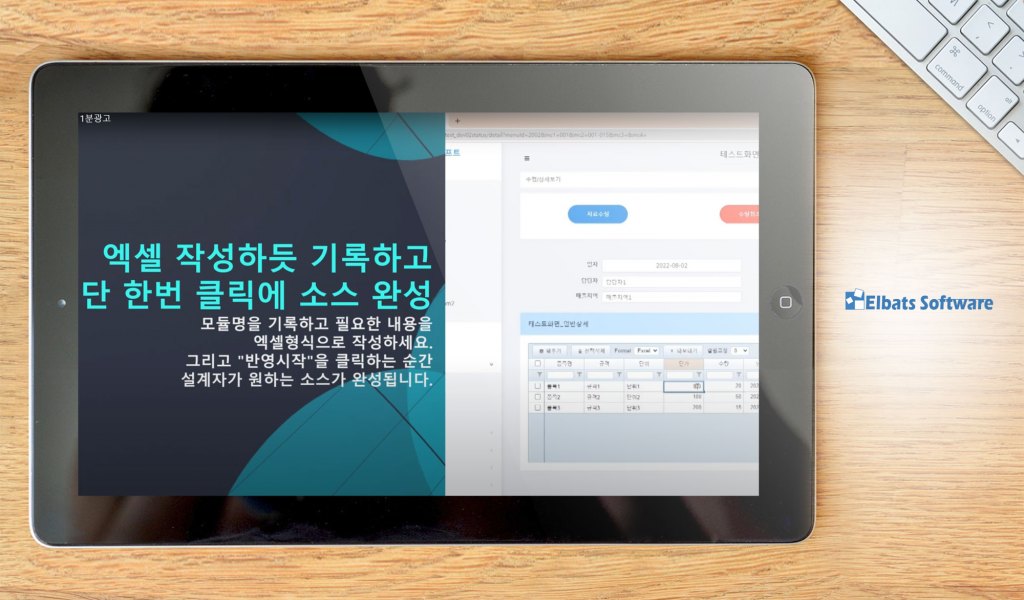
Elbats MES is a comprehensive digital business solution that is a combination of manufacturing management and product lifecycle management software tools. Its comprehensive features make it a go-to application for small and medium-sized factories and manufacturing companies. Key features include production/quality management, critical component tracking, source tracking, raw materials monitoring, materials grading, purchasing management, sales management, and delivery control. Moreover, it has tools for rapid process development with full work-in-process coordination capabilities.
Also, it provides users with intelligence solutions such as a reporting module complete with key performance indicators. Furthermore, it has a predictive maintenance management module reminiscent of those found in facility management software. Lastly, Elbats MES is only available via quote-based pricing.
Detailed Elbats MES Review
Key Features of Elbats Software
- Production/Quality Management
- Sales Management
- Predictive Maintenance Management
- Raw Material Monitoring and Grading
- Delivery Control and Management
- Key Performance Indicators
- Full Work-in-Process Coordination
- Rapid Process Development
17. Deltek Costpoint
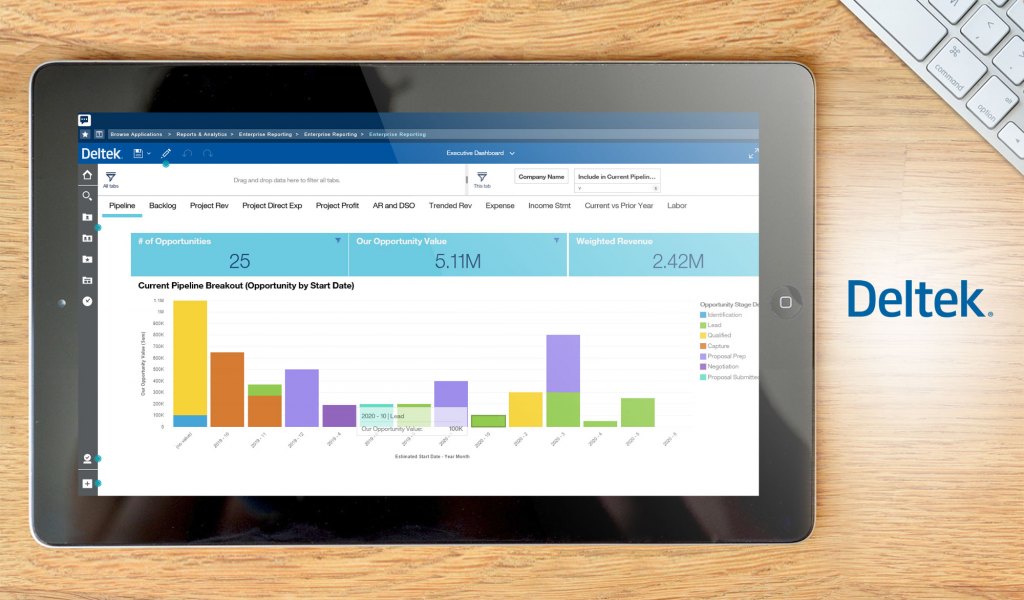
Deltek Costpoint is a PLM software solution known for bringing in great ERP features. The platform is specially designed for government contractors and helpful to those that supply food and beverage products to government agencies. Key features include product traceability, compliance, cost control, quality management, and procurement management. The platform is also known for its financial tools that could rival some standalone accounting solutions. This comes with highly-intuitive visualizations. Lastly, pricing starts at $30 per user per month.
Detailed Deltek Costpoint Review
Key Features of Deltek Costpoint
- Manufacturing Business Intelligence
- Compliance Support
- Traceability
- Data Centralization
- Quality Control
- Cost Control
- Human Capital Management
- Procurement Management
18. Product HQ
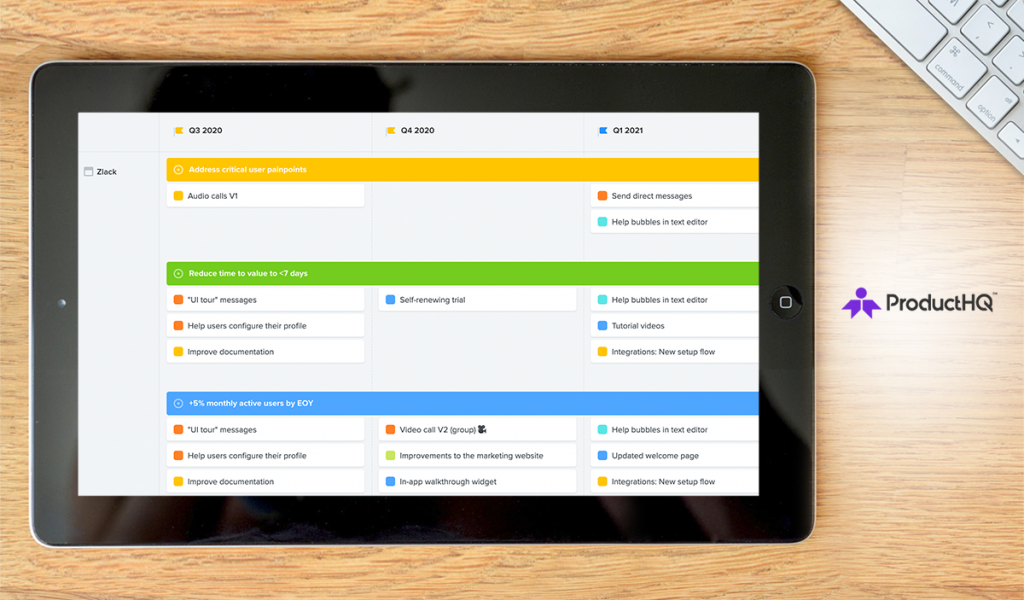
Product HQ is an easy-to-use collaborative product roadmapping solution for PLM. Thanks to its high out-of-the-box usability, it is widely used among SMEs. Moreover, it is flexible enough to be used for simpler food and beverage operations. Key features include an idea-collection tool, collaboration tools, public roadmaps, feature prioritization, and tracking. Also, Product HQ is currently working on building integrations with other business tools. These include Jira and Zendesk. Lastly, it is only available by personalized quotes.
Detailed Product HQ Review
Key Features of Product HQ
- Product Roadmap
- Public Roadmap
- Team Communication
- Idea Collection
- Feature Prioritization
- Feature Tracking
- Collaboration Tools
- Customization
19. Aras Innovator
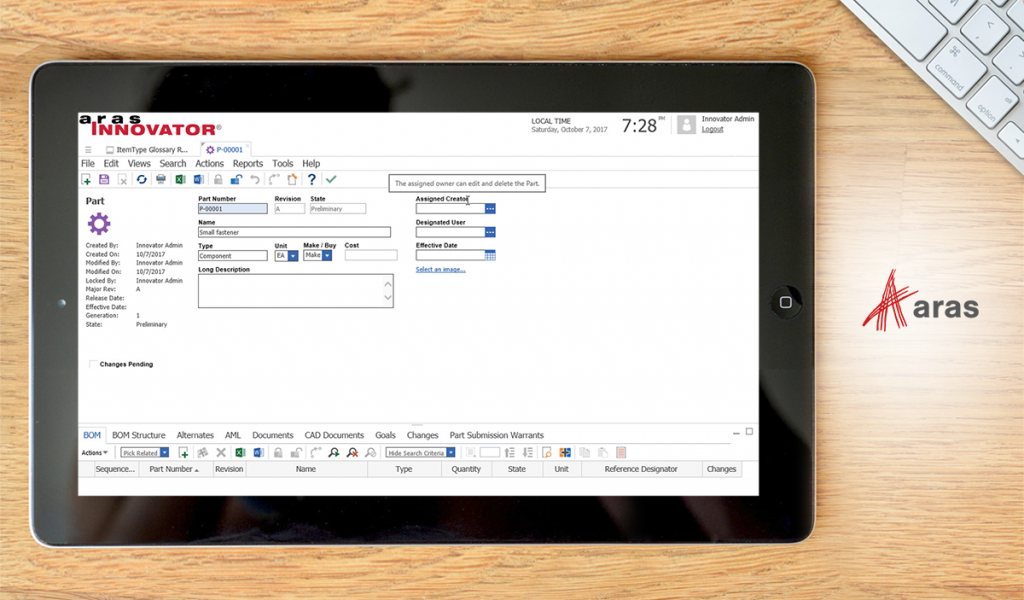
Aras Innovator is a PLM solution with a specific food and beverage deployment. It helps users speed up their production and improve both retailer and customer satisfaction. Key features include product management, resource management, BOM management, visibility, documentation, and project visibility. One great thing about the platform is that it allows for a truly global “single source of truth” for critical intellectual property management when it comes to formulas and recipes. It also comes complete with auditing and traceability tools. These include tools for creating product processing instructions, monitoring raw materials, QR coding, creating product artwork, and also those for regulatory compliance.
Moreover, the product has an open API system. Hence, you can virtually connect it to other business solutions such as CAD and ERP suites. Lastly, it is offered via tiered pricing plans with the 100,000+ user tier costing $12 per user per month. The tier for 250+ users costs $70 per user per month. For organizations with less than 250 users, the product is only available via quote-based plans.
Detailed Aras Innovator Review
Key Features of Aras Innovator
- Product Management
- Global Formula and Recipe Management
- Raw Materials Monitoring
- Product Traceability
- Bill of Materials
- Microsoft Office Style Interface
- Cross Discipline Collaboration
- Project Visibility
20. GLIDR
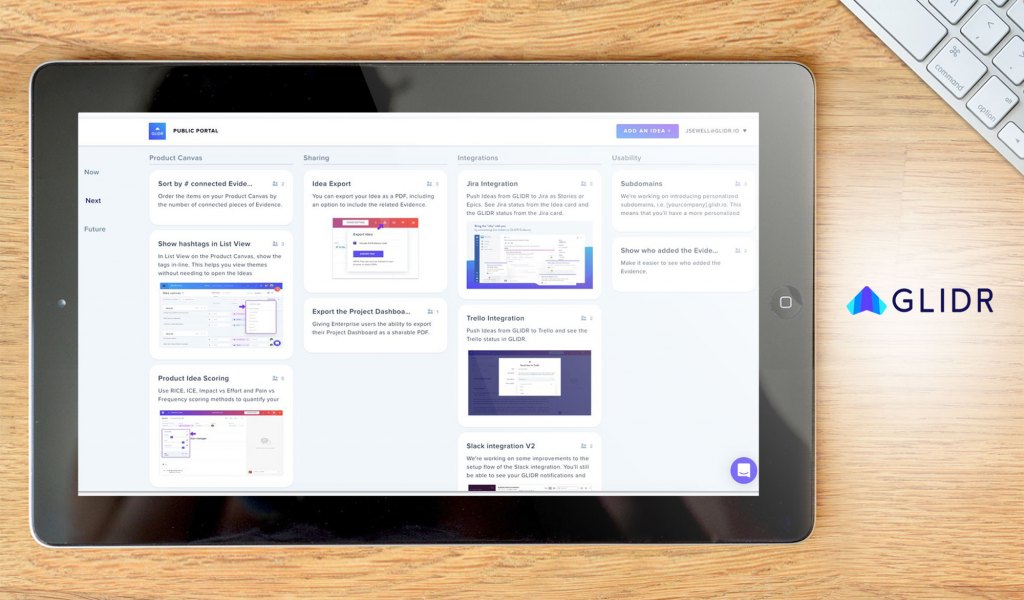
GLIDR is a multi-purpose PLM software solution. It is flexible enough to be used by businesses of different sizes across different industries. Key features include product assumptions, project workspace, trend scores, evidence, collaboration tools, and market sizing. Also, it allows users to customize their canvas for better product roadmap designs.
With its customer-centric tools, users will be able to gather useful customer data on their behaviors, preferences, and demands. In this way, business users will be able to fill in these gaps with custom food and beverage products just for them. The product works seamlessly with other digital tools such as Trello and SurveyMonkey. Lastly, pricing starts at $8.20 per user per month.
Detailed GLIDR Review
Key Features of GLIDR
- Product Assumptions
- Project Workspace
- Experiments and Research
- Collaboration
- Prioritizations
- Notifications
- Evidence
- Trend Scores
What is the best PLM software and system for food and beverage for you?
The answer to this question really depends on what you need—and what you need depends on the size of your company, what market you are in, and many other factors that probably only you know best. This is because there are different kinds of PLM software and systems for food and beverage available. As mentioned, there are general solutions. Some of them are highly flexible and can work in virtually any industry. Others are industry-specific or have pre-made industry-specific deployments. Also, there are those that are highly specialized such as road mapping software.
But if you are looking for a PLM solution that is flexible, easy to use, and something that you can make your own, then monday.com can work for you. It can serve as your command center for all of your PLM processes. These include product design, planning, manufacturing management, and even artwork development for your ads and packaging. The software comes with high out-of-the-box usability and you can easily customize your workflows right off the bat.
In fact, monday.com can work in any company and can manage operations of great complexity. As the leader of the best PLM software and systems for food and beverage, it works with such giants as Unilever and Coca-Cola, along with other types of companies such as the Discovery Channel and Canva. The best way to know whether it fits your needs is for you to take advantage of its free trial.
Key Insights
- Versatility and Customization: monday.com stands out as the best PLM software for food and beverage in 2024 due to its highly customizable workflows and integrations with various software solutions, making it a versatile command center for all PLM processes.
- Market Growth: The food and beverage industry has shown resilience and growth, with the global market expected to reach $856.9 billion by 2025, driven by innovation in product lifecycle management.
- PLM Importance: PLM software is crucial for managing the complex processes involved in product lifecycle management, from design and production to marketing and compliance.
- Competitive Edge: Effective use of PLM software provides companies with a competitive edge by optimizing operations and facilitating the creation of new product lines.
- Top PLM Solutions: Other notable PLM software solutions for the food and beverage industry include SAP PLM, Siemens Teamcenter PLM, Autodesk Vault, Infor PLM Discrete, and Oracle Agile PLM, each offering unique features tailored to specific needs.
- Industry Adoption: Even smaller companies in the food and beverage sector are increasingly adopting PLM tools to streamline operations and stay competitive.
FAQ
- What makes monday.com the best PLM software for the food and beverage industry in 2024? monday.com is highly customizable and integrates seamlessly with numerous other software solutions. It offers a comprehensive set of tools for managing all aspects of the product lifecycle, from design and planning to marketing and compliance. Its user-friendly interface and mobile accessibility make it an excellent choice for companies of all sizes.
- How does PLM software benefit the food and beverage industry? PLM software helps manage the entire product lifecycle, ensuring efficient design, production, and marketing processes. It aids in maintaining compliance with industry standards, optimizing supply chain operations, and improving collaboration across departments, ultimately leading to better product quality and faster time-to-market.
- Which other PLM software solutions are recommended for the food and beverage industry? In addition to monday.com, other recommended PLM software solutions include SAP PLM, Siemens Teamcenter PLM, Autodesk Vault, Infor PLM Discrete, and Oracle Agile PLM. Each of these solutions offers specialized features that cater to different aspects of the product lifecycle and industry-specific requirements.
- How has the food and beverage industry evolved post-COVID-19? The food and beverage industry has demonstrated resilience and growth post-COVID-19, with increased focus on product lifecycle management to navigate trade restrictions and market changes. The industry’s adaptability and innovation in using PLM tools have been key factors in its recovery and continued growth.
- Why is a digital command center essential for modern PLM in the food and beverage industry? A digital command center provides a centralized hub for managing all PLM processes, offering real-time visibility and control over operations. It facilitates better decision-making, enhances collaboration, and ensures that all aspects of the product lifecycle are aligned with the company’s strategic goals.













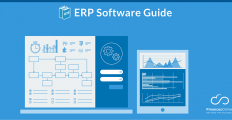













Leave a comment!